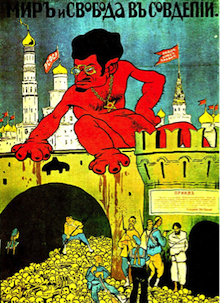

|
The Moscow Directive  White anti-Bolshevik poster On 3 July Denikin issued his Moscow Directive, the order for a general attack on the Soviet capital. It was an all-or-nothing gamble, counting on the speed of the White cavalry to exploit the temporary weakness of the Reds. Wrangel opposed the offensive, warning that it ran the risk of advancing too broadly without protection in the rear in the form of trained reserves, sound administration and lines of supply to maintain the offensive. He turned out to be right. The Whites pushed north through Ukraine. On 14 October they took Orel, only 250 miles from Moscow. The Bolsheviks were thrown into panic. Precisely at this moment, just as Denikin was threatening to capture Moscow from the south, another White army led by General Yudenich was threatening Petrograd. But Denikin's forces had overstretched themselves. In the rear the Whites had left themselves without enough troops to defend their bases against Makhno's partisans and Ukrainian nationalists, and at the height of the Moscow offensive they were forced to withdraw troops to deal with them. Without regular supplies, the advanced troops broke down into looting peasant farms (the Cossack cavalry, who held the Russian peasants in contempt, were the worst offenders). But the real problem of the Whites - and the biggest reason for their failure - was their inability to mobilize enough peasant troops in Ukraine and south Russia. The peasants were afraid that a White victory would lead to the reversal of their revolution on the land. As the Whites advanced towards Moscow the peasants rallied against them. Between June and September a quarter of a million deserters returned to the Red Army from the two military districts of Orel and Moscow alone. These were regions where the local peasantry had made substantial land gains in 1917. However much the peasants might have detested the Bolshevik regime, with its requisitioning and bossy commissars, they would continue to defend it as long (and only as long) as it stood between the Whites and their own revolution on the land. |
© 2014 Orlando Figes | All Rights Reserved